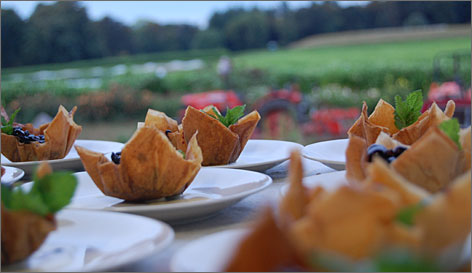
10 Aug Farm to table… the next generation of Maine culinary travel
Farm-to-table is probably a phrase that every foodie has heard of. But it still lurks in the shadows of culinary tourism. Often steeped in the confusion about its origins and why it now has such a prominent place at the table for foodies, this article will show you what all the fuss is about. Farm-to-table is the next generation of haute cuisine and is something that every foodie and culinary traveler should experience. Maine offers a myriad of options for groups interested in experiencing this dining revolution and we are excited to take you there!
On a recent Fall night, more than 100 people shelled out nearly $200 to tromp through a rural Virginia field in the near-dark to an outdoor table illuminated only by candles. Their reward? A five-course meal from Chef Anthony Chittum of Vermillion in Alexandria that included crispy soft-shell crabs, cornmeal-crusted catfish, bison chops, and peach-and-blackberry pie– all made on a makeshift kitchen at the George Washington Birthplace National Monument.
The site was two hours away from Chittum’s restaurant, but just a stone’s throw away from the aquafarm where the catfish were raised. Such farm-to-table dinners– where diners interact with farmers, even eating their meals outside– are the cornerstone behind Outstanding in the Field, a group founded by California surfer-turned-chef Jim Denevan. The group travels around the country promoting locally grown food.
The movement has taken root among foodies around the USA. Chefs nationwide are hosting farm dinners in their restaurants, and organizations such as Meadow Lark Farm Dinners in Colorado and Plate & Pitchfork in Oregon are bringing diners and the meal to the farm.
“When we started doing dinners, ‘local,’ ‘sustainable’ and ‘organic’ were not buzzwords,” says Erika Polmar, one of the co-founders of Plate & Pitchfork, which began hosting dinners at Portland-area farms six years ago. “Now everyone is talking about that.”
Denevan has seen his events blossom since the mid-1990s, when he first hosted dinners where area farmers came to his restaurant to provide commentary with meals created from their produce. In 1999, he hosted three dinners in California farm fields.
That first year “was a money loser,” Denevan says. “It was pretty difficult to convince people to come out to the farms. Seeing the farmer give a tour and having the table right at the (food) source, well, that was profound.”
In less than 10 years, Denevan has gone from cajoling friends to attend his dinners to hosting hot-ticket events. The group has thrown more than 100 dinners, most of which sell out quickly. As farm dinners have become more mainstream, the price has increased. Outstanding in the Field dinners started at $60 and are now $180 per person. Plate & Pitchfork dinners began at $75 and now range from $90 to $150, depending on whether the event is also a fundraiser. Denevan says the increase is necessary for the high-end experience he aims to create. Polmar cites rising food costs.
“Not being able to offer these dinners to an audience that isn’t affluent is a stumbling block for us,” Polmar says. Being able to afford the dinner, however, is the only common denominator among guest lists that blend flannel-clad hippies with Fendi-bag-carrying foodies.
“We see twenty- and thirty-somethings who are coming on date nights,” Polmar says. We’ve had businesses buy an entire table for a client-appreciation night.
The changes Polmar has seen go far beyond ticket price.
Today, diners “are much more informed,” Polmar says. “People are paying far more attention to how their food is being raised, processed, and how it gets to their table.”
For the chefs, organizers, and farmers involved, that is the point. It’s education with a sweet glaze of entertainment. And the foodies who try the farm-to-table experience because it’s adventurous or sexy are getting the point, too.
“You lose where food comes from, especially in a city environment,” says Pete Webb, 34, who attended Chittum’s farm-to-table dinner with his wife. “It was eye-opening to hear from the farmer and the vintner who raises the buffalo. We’ve been more environmentally conscious. We’re buying more local produce. It already changed our habits.”


No Comments